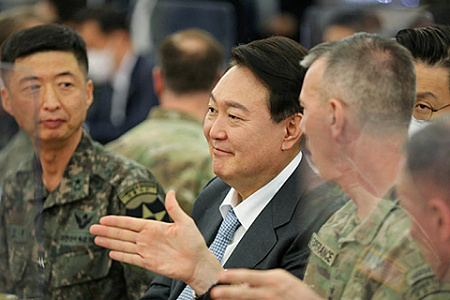The Korean peninsula has become closer to war after the elections in the South
Recently, with the approach of Yun Sogel's accession to the presidency, the rhetoric of the South Korean leadership regarding regional security issues has become tougher. Against this background, on April 6, a group of aides to the President-elect of the Republic of Korea for foreign policy and security met with the US President's National Security Adviser John Sullivan.
Back in the fall, as a presidential candidate, Yun Sogel called on the United States to return nuclear weapons to South Korea, but then his call faced sharp criticism from China and the United States. In addition, during the election campaign, the future South Korean president announced his intention to purchase THAAD anti-missile systems. The South Korean side reported that during the negotiations on April 6, this issue was not a priority and was not discussed. Apparently, however, the president-elect of South Korea is moving from words to actions, not abandoning attempts to enlist the support of the United States on security issues and justifying such attempts by the threat from the DPRK.
Yun Sogel made several loud statements against the background of the DPRK's tests of an intercontinental ballistic missile – for example, that his government was going to "normalize" joint exercises with the United States, which, under the current president Moon Jae-in, began to take place less frequently as part of the latter's policy of rapprochement with the North.
The advisers of the future president at the meeting on April 6 also sought the relocation of the "strategic assets" of the United States: these include nuclear bombers, nuclear submarines and aircraft carriers. This is exactly what was discussed on April 6 during the talks in Washington.
Insisting on "expanded deterrence", which implies the commitment of the United States to use both conventional and nuclear weapons to protect allies, Yun Sogel seeks to strengthen South Korea's security and persuade the DPRK to dialogue. After the April 6 talks, the United States did not comment on the possibility of deploying its troops on the Korean peninsula, saying only that it would support the allies. At the same time, the United States continued to call on the DPRK to stop "destabilizing actions" and sit down at the negotiating table.
The visit took place on the eve of the Quad Group summit (USA, Japan, India, Australia), tentatively scheduled for May. South Korea expects that American President Joseph Biden will hold a Seoul-Washington bilateral meeting as part of his trip to Asia, where, among other things, the parties will touch on the policy of deterring the DPRK. But it is unlikely that the newly elected South Korean president will succeed in his latest endeavors: the emphatically restrained rhetoric of the United States regarding the deployment of missiles in Korea does not change even in conditions of heightened tension.
Despite the calls for dialogue with the DPRK made at Blinken's Hawaii meeting with colleagues from South Korea and Japan, the general mood of the countries of the region remains pessimistic – especially given past statements by the United States that the DPRK does not respond to the offer of negotiations.
In South Korea itself, it is increasingly being said that the DPRK, with the support of Russia and China, will continue missile tests, in connection with which the United States and the ROK are calling on Moscow and Beijing to reduce support for North Korea. However, as it became clear from the briefing with the US Special Envoy to the DPRK, Sun Kim, all US consultations with the PRC remain at the level of consultations and do not lead to any real actions. Russia and China are hindering US attempts to approve new sanctions in the UN Security Council in connection with the North Korean nuclear program, despite Washington's calls for cooperation, and their reaction to the March tests turned out to be restrained.
In general, it is expected that after Yun Sogel takes office as president, relations between the South and the North will become more tense. But this is due not only to the offensive rhetoric of the new president, but also to the intensified North, which first tested ICBMs, and then said that it would consider lifting the self-proclaimed moratorium on nuclear tests. Yun Sogel still insists on continuing negotiations with North Korea on the complete denuclearization of the Korean peninsula, but at the same time talks about "expanded deterrence" and the possible return of nuclear weapons to South Korea.
The reaction of the United States itself to such statements is quite cautious. They are ready to support the containment of the DPRK and conduct exercises, but there is no talk of active actions like the return of nuclear weapons or the strengthening of expanded deterrence. The main players are now busy solving their own problems, and the DPRK apparently took advantage of this chance to activate its nuclear program, realizing that no harsh reaction would follow.
Yun Sogel's rhetoric in this situation only contributes to the tightening of the DPRK's position, and until this rhetoric changes, North Korea will not sit down at the negotiating table.
Ekaterina Volynskaya
Ekaterina Aleksandrovna Volynskaya is a trainee at the PIR Center.

